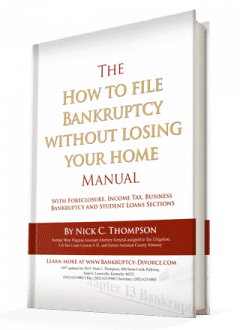To qualify for a Chapter 7 bankruptcy in Kentucky, a debtor must pass the “means test.” About 97% of all debtors qualify for a Chapter 7 bankruptcy. The means test has two parts. In the first part, you automatically qualify if your income is below the average household income for your household size and location. The table is below. This page and the figures used on this page were updated February 29th 2024, and the US Trustee updates these amounts four times every year.
In the second part of the means test, you can also qualify if your reasonable and necessary household expenses from your income do not leave enough to make a meaningful Chapter 13 payment. If all you have leftover is 120 dollars per month after expenses, you do not have a significant Chapter 13 repayment to benefit creditors.
So you can make more than the average income for your family size and still pass. The means test only forces the top 2-3% or so of wage-earners into Chapter 13. More commonly, people choose Chapter 13 because they have property they must keep or special debts that only Chapter 13 can manage. The bankruptcy means test averages your prior six months of income minus your monthly household expenses to calculate your annual income and qualify for a Chapter 7 bankruptcy.
A Chapter 7 bankruptcy has no debt limit. Only individuals can file a Chapter 13. Businesses cannot file a Chapter 13 and are limited to Chapters 11 or 7. Chapter 13 has a 2.7 million dollar debt limit after June of 2024. By filing an individual Chapter 7 or 13, your small business might not have to file bankruptcy, especially if a debtor is the only owner of the business.
Many small businesses can effectively reorganize if the owner files a Chapter 13 or 7. Both corporations and individuals may file Chapter 7. But only people who have less than 2.7 million in debt can file a Chapter 13. You can know more about the budget requirements of Chapter 7 and 13 bankruptcy cases.
Qualify for a Chapter 7 Bankruptcy in Kentucky- Pass a “Means Test”
There are times when there is a purpose for Chapter 13, such as catching up on a mortgage or managing student loans and income taxes, which are not dischargeable. But you should never be talked into a Chapter 13 just because the attorney makes more money by filing Chapter 13 cases.
Proper Reasons to File Chapter 13
- You may only file one Chapter 7 every eight years.
- Higher-income debtors with significant disposable incomes are required to repay something back in Chapter 13s.
- A Chapter 13 can protect a cosigner or allow you to keep a property you would have lost in a Chapter 7.
- Chapter 13 is effective if you need to stop a foreclosure, student loan or income tax collections and abusive interest and penalty charges.
The means test amounts you can earn and still qualify for Chapter 7 are adjusted four times each year. As an example, the table below shows the income levels in Kentucky and Indiana for May 2021. However, each county has different average incomes.
Your income determination is from the prior six months of income divided by six and then multiplied by 12 to get the average annual income for the Kentucky bankruptcy means test. By timing and lowering your income temporarily, such as filing while you are unemployed, back to school, or on maternity leave, you might be able to file a Chapter 7 bankruptcy.
To qualify, you can:
- Earn less than the amounts in the table directly below.
- Meet one of the exceptions such as being a disabled veteran who acquired debt while in the military 38 U.S.C. § 3741(1). Other exceptions that allow you to immediately qualify are listed below.
- Or, your reasonable and necessary expenses which leaves you with no meaningful Chapter 13 payment.
Updated for 2-2024 you can check with the US Trustee website for the most recent
| State | 1 Person | 2 Persons | 3 Persons | 4 Persons | 5 Persons |
| Kentucky | $55,235 | $67,141 | $80,316 | $98,032 | $107,932 |
| Indiana | $57,965 | $74,513 | $87,816 | $101,407 | $111,307 |
Exceptions to the Means Test in a Kentucky Bankruptcy
The means test is only a presumption your filing is or isn’t filed in bad faith. Some facts, such as a sudden disability, may allow you to file a Chapter 7 even if you fail the means test. Sudden changes in circumstances may make Chapter 13 not feasible. You only need to explain a reason that allows you to file, such as a recent retirement or sudden disability, to overcome this presumption. Your seasonable income may also be an excellent reason to prove the means test should not be a basis for you to be denied filing as a Chapter 7.
If over 50% of your debt is business debt, you qualify under that exception of the means test. Veterans who incurred most of their debt in service are also excluded from the means test. Income from Social Security, Veterans benefits, and disability are excluded from the means test but are used in the budget income and expenses part of the petition in schedules I and J.
Loading Debtors into a Chapter 13
I have met a Kentucky bankruptcy lawyer who brags 95% of their clients file Chapter 13. About 70% of the cases filed nationally are Chapter 7 cases. Chapter 13 pays an attorney about three times the average Chapter 7 fee. Some offices do load clients into Chapter 13 cases.
Make certain Chapter 13 is what benefits you, not your attorney. I have seen attorneys include disability as income in the means test to ensure they earn the higher fee from Chapter 13 cases. I have also seen an attorney claim it only took 50 dollars per family member for groceries. Chapter 13 must be reasonable, affordable, and serve your goals. At the same time, bankruptcy requires debtors to file in good faith and uses their best efforts to repay. If the disposable income is there, the debtor must file a Chapter 13.
 What is Allowed in Chapter 7 Budgets?
What is Allowed in Chapter 7 Budgets?
Even if your income is higher than the average family income, you may still pass a Kentucky bankruptcy means test. You can still file Chapter 7 bankruptcy if, after deducting for reasonable and necessary expenses, there is only $150 or less in disposable income left or if what is left pays back little to unsecured non-priority creditors. Debtors often forget expenses such as their annual car tags or daycare expenses. You have child support, car insurance, medical expenses, and daycare expenses, even if you have not been able to afford them recently.
You qualify for filing a Chapter 7 bankruptcy if your budget leaves very little or nothing to repay creditors in a Chapter 13 bankruptcy. Under the means test, the U.S. Trustee may challenge your Chapter 7 if he can show you have sufficient non-refundable income to afford a Chapter 13 payment. But the U.S. Trustee generally doesn’t challenge a case filed initially as a Chapter 13 which converts later to a Chapter 7 after the debtor makes reasonable efforts to make it work and shows that his budget no longer can afford Chapter 13.
You can download these often-overlooked expenses, and there is also a list of the typical categories of costs for the average budget. You are allowed reasonable 401k contributions, 401k loan repayment, and charitable expenses. But they look at what expense history you had before filing. You can include private school deductions for a child with a disability if you have a history of these past expenses. You may need to document medical or other expenses that are unusually high. School lunches, vacations, taxes, kids’ school activities, repair and replacement of household goods, pet care, haircuts, grooming, and yard care are also necessary expenses people often overlook.
Other Considerations for the Means Test and your Budget
1. Chapter 13 can Include Business Debts
People with mom-and-pop businesses often file a Chapter 13 and include their business debts. This may essentially allow their company to restructure without filing an expensive Chapter 11. Chapter 11 has a 95% failure rate. Chapter 7s are completed and get a discharge over 99% of the time, and Chapter 13 cases complete or convert to a Chapter 7 over 70% of the time. In 2021, you could only file a Chapter 13 if the debts that are not secured are less than $419,275 and the secured debts are less than $1,257,850 due to 11 U.S.C. § 109(e). Amounts are adjusted annually by the consumer price index, and congress drastically increased the Chapter 13 debt limits in 2022 to 2,750,000 with no limit as to whether they were secured or unsecured.
2. Chapter 13 Bankruptcy Plans and Modifications Can be Less Expensive than Chapter 7
The Kentucky Bankruptcy Courts often approves Chapter 13 Bankruptcy plans which repay 10% or less to unsecured debts. If a Chapter 13 strips your second mortgage, a Chapter 13 may be cheaper than a 7. And Chapter 13 discharges more types of debt than Chapter 7. A Chapter 13 can lower the interest rate of your auto loan and stretch out a car loan. If the auto loan is over 910 days old, it can strip the secured part of the car loan down to the value of the auto.
The Louisville, Kentucky Bankruptcy Court requires you to file an annual budget if your Chapter 13 plan is less than 100%. If your income changes, your plan payment may decrease or increase. Most of the time, your plan payment actually lowers. Filing annual budgets is not usually required in the Southern Indiana District. If your income falls, you might also be able to lower plan payments by supplying a budget with a simple motion to modify the plan for a lower payment.
Filing a Chapter 13 is often more affordable, has more significant benefits, and costs less than debt settlement. You also get the power of a federal judge’s court order. So, instead of begging the bank to accept a payment of 50 to 70% in a debt management settlement, you can often force them to take 10% if that is all your budget can afford. A Kentucky Bankruptcy Chapter 13 requires you to pay what expendable income you have based on your budget, but that plan may repay zero to unsecured debts.
Expenses that Might Help for Means Test
Following are some reasonable and ordinary expenses you might deduct from your budget list to pass a means test. It will help you a lot if you are spending on any of these expenses:
 1. Mortgage, and Other Secured Debt Payments
1. Mortgage, and Other Secured Debt Payments
Secured payments are for assets a creditor has an ownership interest in. Secured debts have a lien which gives the creditors a right to reclaim property, a house, or a car. Even if your home mortgage or car payment is slightly above the basic living standards, you can deduct it to pass the means test. A Ram truck is probably deductible especially if you need it for work. A Rolls Royce isn’t.
The means test looks at the entire budget of income and what reasonable and necessary expenses are. It looks at what the normal and average rent or mortgage is and suggests what a normal plan payment should be. However, it then allows your actual mortgage and required expenses such as child support and only requires a Chapter 13 if there is a significant amount leftover. The debtor has a duty to make his best efforts to repay his debts if it is possible.
2. Do not Forget Necessary Expenses such as Child Care
It is easy to forget some of the expenses that are necessary such as property taxes. If you fail to include these expenses you are left with a budget that will and must fail.
If you have children, you are probably spending up to 1000 per month per newborn for daycare. These expenses such as special medical costs must be in the budget or it will fail. Expenses for child care, including babysitting, monthly school supplies and after school activities, daycare center, or preschool admission.
3. Income Tax
You are obligated to pay income taxes from your income. Just to survive and pay for gas to work you may have recently cut your tax contributions and withholding. However, you have to pay taxes at the end of the year. A budget will fail if you don’t include these expenses.
4. Healthcare and Retirement Expenses
Regardless of the cost of the healthcare expense, it is almost always a reasonable and necessary expense but you may have to document it. Likewise, retirement accounts are reasonable and necessary expenses. However, with retirement expenses, you cannot suddenly start a retirement account just before filing and expect it to be allowed.
5. Donations
Just like retirement, charitable donations are allowed if there is a history of your donations to the church or other charity. The court in general does not require documentation unless it is over 50 per month.
What if I Fail Means Test?
If you fail to pass the means test, that doesn’t necessarily mean you cannot file bankruptcy. If there is an amount you can repay you can file it as a Chapter 13. Often this is only temporary if your work is seasonal. Many persons have gone back to school or taken off from work so that they will qualify.
You often have the ability to increase expenses or lower an income and this only has to be for long enough to qualify. If you do have the reasonable expectation that your income will increase by going to better employment, you do that the responsibility to disclose that. The finances and expenses calculated in your means test are based on your financial status for the previous six months. This often changes and you can attempt the means test at any later time to determine eligibility for Chapter 7 bankruptcy.
However, if you can’t wait for the next six months and want to file for bankruptcy, ask your bankruptcy attorney to file for Chapter 13 as that would be the only option left.
What Should I Do Next?
Always try to use the best bankruptcy attorney in Kentucky you can get. That may not be the most popular lawyer. You want someone who produces the best petition. Better petitions often mean less property lost, lower Chapter 13 plan payments, more debt discharged, and less secured or priority debt. You should not be buying advertising or slick salesmanship. Seek the best quality in representation.
You will need to first take the credit counseling course and gather the documentation that is required. You have to take the debtor education course after you have filed the bankruptcy if you want the discharge. If you are only seeking to catch up on the mortgage you may not need to wipe out your liability for the debts. You only get one discharge every eight years in Chapter 7 so only take the debtor education if you have unsecured debts which you need to discharge.
Planning your Bankruptcy
You are not normally trying to discharge secured, or priority debts. Normally the secured debts are not the problem. Priority debts cannot normally be discharged but there are exceptions that can allow you a discharge of student and income tax debts. To understand the bankruptcy details in depth, schedule a sitting with an attorney to examine your assets and possible scenarios.
Take your time and discuss all your thoughts with your attorney. We are here to listen to you and prepare your petition in your favor and protect you by using the bankruptcy code, Kentucky bankruptcy exemptions. By the way, Kentucky uses the federal exemptions, other states like Indiana use their own set of exemptions which allow you to keep the property.
It can take just a single meeting to prepare your petition if you are prepared. But some people want to talk about it first to plan their strategy. We are happy to do it either way including a first meeting to get to know more about your case and possible beneficial options.
File Chapter 7 Bankruptcy with Attorneys You Can Trust!
We put our skills and experience together to help you qualify for a Chapter 7 Bankruptcy in Kentucky. We have been representing clients in courtrooms for 30+ years now and understand what it takes to bounce back and recover with more financial stability after a bankruptcy.
Contact our team to schedule an appointment immediately. We will never forward you to an inexperienced junior attorney or paralegal whether it is related to bankruptcy chapter 7 or 13 or debt settlement.
 Resources for Bankruptcy
Resources for Bankruptcy
Louisville, Kentucky Bankruptcy Forms
Benefits of a Chapter 7 Bankruptcy • Video
What is the Student Loan Brunner Test?
Filing Chapter 7 & Chapter 13 Bankruptcy
Student Loan Bankruptcy Qualifications
Chapter 11 Business Bankruptcy Information
If you are thinking about filing bankruptcy, don’t delay because timing is crucial. I am here to help you. So, contact my office right away to start the conversation—Nick C. Thompson, Bankruptcy Lawyer: 502-625-0905.



